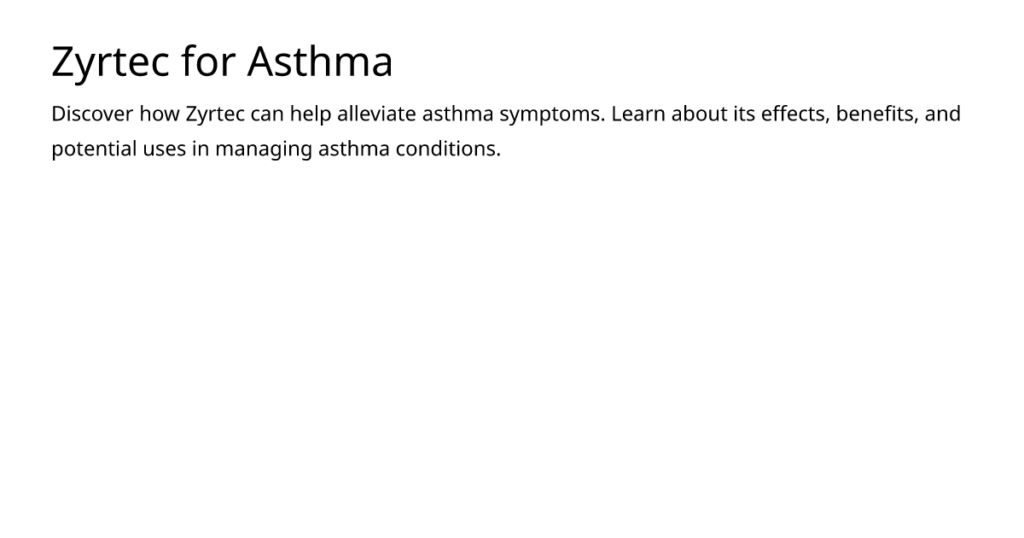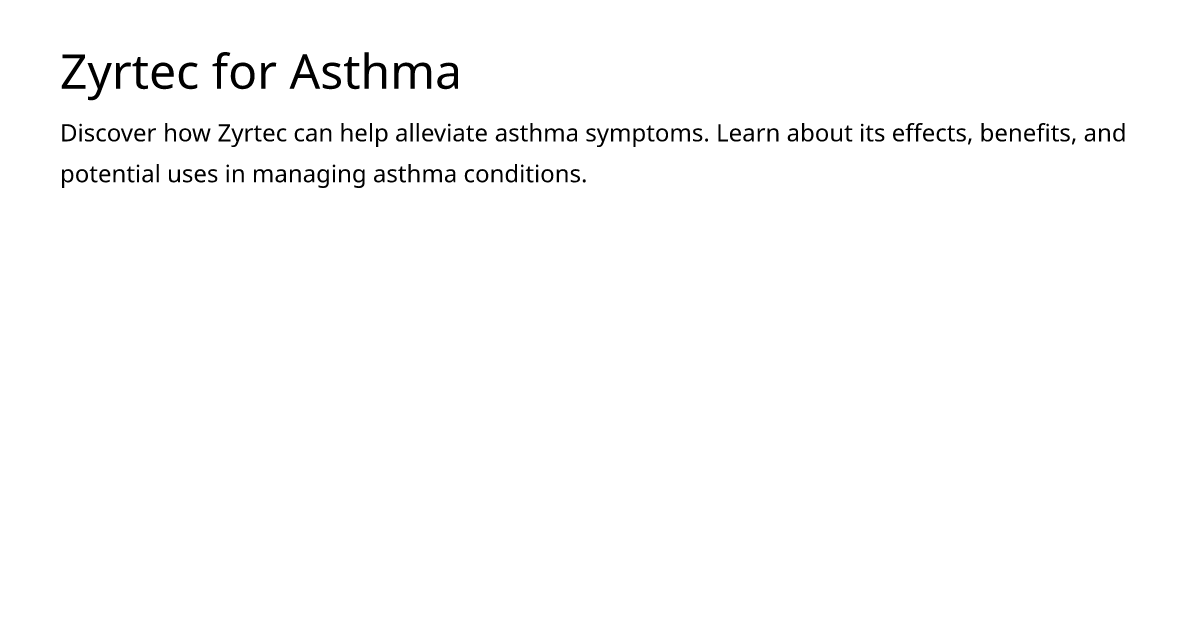
Zyrtec and Asthma: Understanding the Connection and Management
Asthma and allergies often go hand-in-hand, leading many individuals to seek relief from both conditions simultaneously. Zyrtec, an over-the-counter antihistamine, is frequently used to alleviate allergy symptoms. But how does Zyrtec interact with asthma, and is it a safe and effective treatment option for those with both conditions? This article delves into the relationship between Zyrtec and asthma, exploring its uses, potential benefits, risks, and alternative management strategies.
Understanding Asthma and Allergies
Asthma is a chronic respiratory disease characterized by inflammation and narrowing of the airways, leading to symptoms such as wheezing, coughing, shortness of breath, and chest tightness. Allergic asthma, a common type, is triggered by allergens like pollen, dust mites, pet dander, and mold. When exposed to these allergens, the immune system overreacts, releasing inflammatory substances that constrict the airways.
Allergies, on the other hand, are immune responses to normally harmless substances. Common allergy symptoms include sneezing, runny nose, itchy eyes, and skin rashes. In some cases, allergies can trigger asthma symptoms, making it crucial to manage both conditions effectively.
What is Zyrtec?
Zyrtec (cetirizine) is an antihistamine that blocks the effects of histamine, a chemical released by the body during an allergic reaction. By blocking histamine, Zyrtec can relieve common allergy symptoms such as sneezing, runny nose, itchy eyes, and skin rashes. It is available over-the-counter and is commonly used to treat seasonal allergies, perennial allergies, and hives.
The Role of Zyrtec in Managing Asthma
While Zyrtec primarily targets allergy symptoms, its role in managing asthma is more complex. Zyrtec does not directly treat the underlying inflammation in the airways that characterizes asthma. However, by controlling allergy symptoms, Zyrtec can indirectly help manage asthma in individuals whose asthma is triggered by allergens.
For example, if someone’s asthma is exacerbated by pollen allergies, taking Zyrtec during pollen season may help reduce the allergic response, thereby minimizing the asthma symptoms triggered by pollen exposure. In this scenario, Zyrtec acts as an adjunct therapy, addressing the allergic component of asthma management.
Potential Benefits of Using Zyrtec for Asthma
- Reduced Allergy-Induced Asthma Symptoms: By controlling allergy symptoms, Zyrtec can help prevent allergy-induced asthma flare-ups.
- Improved Quality of Life: Managing allergy symptoms can significantly improve the quality of life for individuals with both allergies and asthma.
- Convenient Over-the-Counter Availability: Zyrtec is readily available over-the-counter, making it a convenient option for managing allergy symptoms.
Potential Risks and Side Effects of Zyrtec
While Zyrtec is generally considered safe, it can cause side effects in some individuals. Common side effects include:
- Drowsiness
- Dry mouth
- Dizziness
- Fatigue
In rare cases, Zyrtec can cause more serious side effects, such as:
- Rapid heart rate
- Confusion
- Difficulty breathing
- Seizures
It is important to note that Zyrtec is not a substitute for asthma medications, such as inhaled corticosteroids or bronchodilators. Individuals with asthma should continue to take their prescribed asthma medications as directed by their healthcare provider, even if they are also taking Zyrtec for allergy symptoms.
Furthermore, some studies suggest that antihistamines like Zyrtec may thicken mucus, which could potentially worsen asthma symptoms in some individuals. However, this effect is not consistently observed, and more research is needed to fully understand the impact of antihistamines on mucus production in people with asthma. [See also: Asthma Medications: A Comprehensive Guide]
Alternative Management Strategies for Asthma and Allergies
In addition to Zyrtec, several other strategies can help manage asthma and allergies:
- Asthma Medications: Inhaled corticosteroids, bronchodilators, and leukotriene modifiers are commonly prescribed to control asthma symptoms and prevent flare-ups.
- Allergy Medications: Other antihistamines, nasal corticosteroids, and decongestants can help relieve allergy symptoms.
- Allergen Avoidance: Identifying and avoiding allergens that trigger asthma or allergy symptoms is crucial for effective management.
- Immunotherapy (Allergy Shots): Immunotherapy can help desensitize the body to specific allergens, reducing the severity of allergic reactions over time.
- Lifestyle Modifications: Maintaining a healthy lifestyle, including regular exercise, a balanced diet, and adequate sleep, can help improve overall health and reduce the risk of asthma and allergy symptoms.
- Air Purifiers: Using air purifiers with HEPA filters can help remove allergens from the air, reducing exposure and minimizing symptoms.
When to Consult a Healthcare Provider
It is essential to consult a healthcare provider if you have asthma and allergies, especially if:
- Your asthma symptoms are not well-controlled.
- You experience frequent asthma flare-ups.
- You have severe allergy symptoms.
- You are considering starting Zyrtec or any other new medication.
A healthcare provider can help diagnose your condition, develop a personalized treatment plan, and monitor your progress. They can also provide guidance on medication management, allergen avoidance, and other strategies to optimize your health.
Conclusion
Zyrtec can be a helpful adjunct therapy for managing asthma in individuals whose asthma is triggered by allergies. By controlling allergy symptoms, Zyrtec can help prevent allergy-induced asthma flare-ups and improve quality of life. However, Zyrtec is not a substitute for asthma medications and should be used in conjunction with other asthma management strategies. It is essential to consult a healthcare provider to determine the best treatment plan for your individual needs. Remember, managing both asthma and allergies effectively requires a comprehensive approach that addresses both conditions simultaneously.

